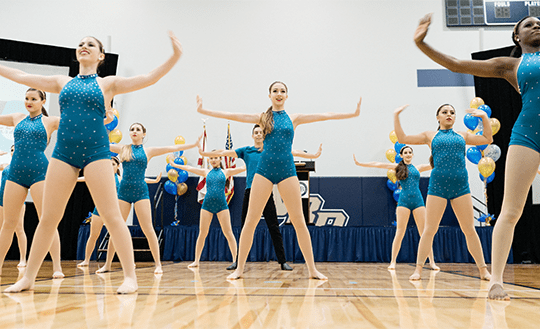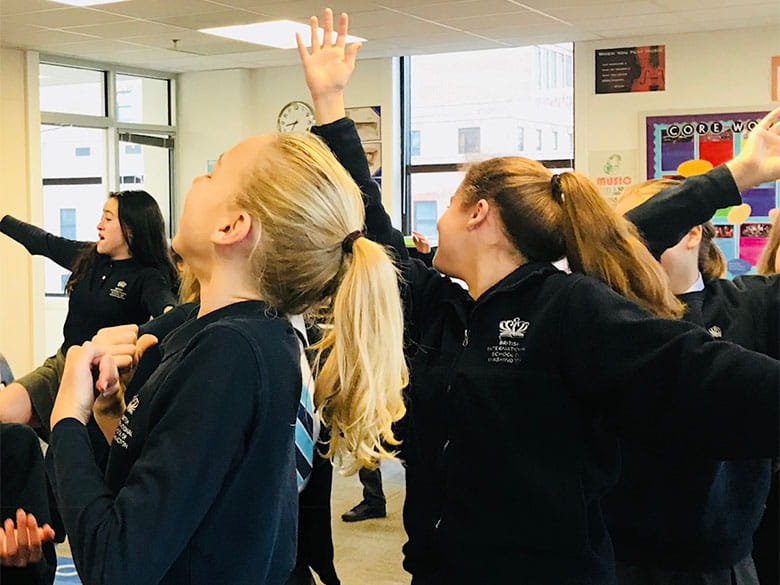We use cookies to improve your online experiences. To learn more and choose your cookies options, please refer to our cookie policy.

Learning dance can be a transformative experience in a child’s education. Rachel White-hunt, Director of Performing Arts at the British International School of Washington talks about how students and teachers are responding to The Juilliard School’s embedded dance curriculum, and why it’s important students experience dance, music and drama together.
There’s a buzz in the air across all our Nord Anglia Education schools. We are in the third year of our collaboration with The Juilliard School, and the programme has evolved from music to include dance and drama.
With each passing year, we have seen the impact of our collaboration with Juilliard on our students and teachers through the results of our annual survey. However, what I would like to explore is why it’s so important that our students experience music, drama and dance. What is so special about the experience of all three disciplines working together? Firstly, you only have to follow Juilliard’s Twitter page to see the astonishing outcome of these disciplines working in tandem. Learning from multiple perspectives is a natural and vital part of Juilliard’s education or the Juilliard way, says the institution’s former President.
“…That's what the arts do. They expand our view of the world. They allow us to be enlightened, to be engaged, to be happy, to be sad, to be introspective, to be extroverted. The arts make us human,” said Dr. Joseph W. Polisi, in an article called “Improving the Environment for the Human Spirit” in Notes on the Road, an online magazine for arts professionals.

Nord Anglia teachers experience much of this during their Juilliard training in New York City, when they learn about a range of teaching artistry from drama, music and dance specialists. This becomes a magical moment for educators where we see first-hand a performing arts piece from a new angle. As subject teachers we do not lose autonomy of our own subjects but rather experience them from many different creative perspectives.
The Juilliard Creative Classroom, an online repository of curated material designed by Juilliard specifically for NAE schools, is a support tool for teachers that enriches student learning. Teachers can draw on techniques from drama, dance and music in activities that deepen a student’s understanding of a concept.
For example, the “Composer of Today” activities for the music section of the Juilliard Creative Classroom use the works of Sean Shepherd to enable students to explore and experience one of his musical compositions through movement, and how that can impact their own personal use of space.
Other components of the Creative Classroom include an exercise where students listen and examine the opening of a Mozart overture. Students take note of their initial physical reactions to the piece, and then are encouraged to look within and reflect on what worlds they imagine and can create upon hearing such music.
Translating why and how you were moved by music is a great tool that can help students express themselves. All of them end up sharing something quite personal and the work brings students closer together. They become a team that’s creative and wants to support each other.
The performing arts share a common language and principles. Students who experience this wide range of learning can make connections, develop ideas and change in unique ways.
“Dance has changed the way I can express myself,” said Jacqueline, a Year 4 student at the British International School of Chicago, Lincoln Park.
“Dance has given me more responsibility to learn dances and memorise them,” said Shayna, a Year 6 student at the British International School of Chicago, Lincoln Park.
So how do we embed the performing arts in our schools and what will the reaction be? While many of us are used to having music in the curriculum, drama and dance is a new opportunity – and one that is being whole-heartedly embraced. In schools launching dance this year teachers say the student response has been positive.
“Dance gives students an opportunity to let go and express themselves though a medium other than speaking and writing, something they do so much of on a day-to-day basis,” said Laura Towell, NAE-Juilliard Regional Dance Lead at the British International School of Chicago, South Loop.